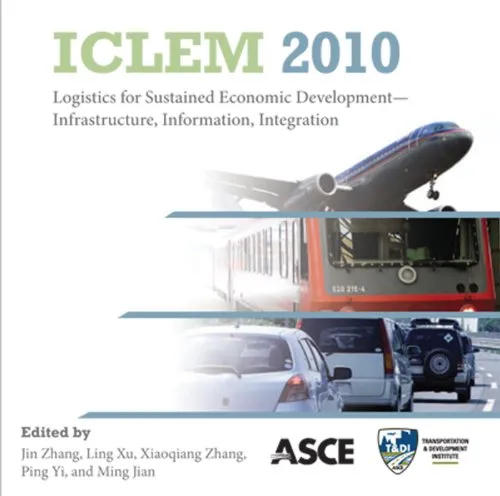ICLEM 2010 : logistics for sustained economic development : infrastructure, information, integration : proceedings of the 2010 International Conference of Logistics Engineering and Management : October 8-10, 2010, Chengdu, China
4.5
Reviews from our users

You Can Ask your questions from this book's AI after Login
Each download or ask from book AI costs 2 points. To earn more free points, please visit the Points Guide Page and complete some valuable actions.Introduction to ICLEM 2010: Logistics for Sustained Economic Development
The book ICLEM 2010: Logistics for Sustained Economic Development is an authoritative collection of research and practices presented during the 2010 International Conference of Logistics Engineering and Management. Convened in Chengdu, China, from October 8-10, 2010, this event brought together thought leaders, academics, and industry professionals to explore the critical role of logistics in driving economic growth and sustainability. With a focus on infrastructure, information, and integration, this book captures cutting-edge insights and practical applications that address the challenges and opportunities in modern logistics.
As the global economy continues to evolve, logistics and supply chain management have become pivotal in sustaining economic development. This book underscores how the synchronization of infrastructure, advanced information technologies, and integration strategies can create competitive advantages for nations and industries alike. Aimed at researchers, practitioners, and policymakers, it offers both theoretical frameworks and real-world case studies to tackle emerging logistics challenges in a dynamic global environment.
Detailed Summary
The proceedings of ICLEM 2010 are a treasure trove of interdisciplinary research covering topics such as logistics infrastructure development, the role of information technology, supply chain optimization, and green logistics. The book is organized around three core themes:
- Infrastructure: This section explores the importance of robust physical and digital infrastructure in fostering efficient logistics systems. It delves into topics like the design of transportation networks, port operations, and urban logistics planning.
- Information: Recognizing the power of data in logistics, this section examines the use of big data analytics, IoT applications, and real-time tracking systems that enable smarter decisions and improved supply chain visibility.
- Integration: Focused on collaboration across borders and sectors, this section highlights integration strategies for achieving seamless operations in global supply chains. Case studies on public-private partnerships and global trade logistics are also included.
With contributions from international experts, the book reflects a broad spectrum of perspectives and practical approaches. Each paper and study within the proceedings is backed by rigorous research and contributes to our understanding of contemporary logistics engineering and management.
Key Takeaways
- The integration of infrastructure, information technology, and process optimization is key to achieving sustainable economic growth through logistics.
- Green logistics is not just a trend but a necessity for reducing environmental impact while ensuring cost-efficiency.
- Collaboration between governments and the private sector plays a crucial role in building future-ready logistics systems.
- Emerging technologies such as IoT, blockchain, and machine learning are transforming logistics operations and supply chain management.
- The development of resilient logistics systems is critical to mitigating disruptions caused by global challenges, such as pandemics and natural disasters.
Famous Quotes from ICLEM 2010
"Logistics is more than just moving goods; it is the lifeblood of modern economies." - Featured in a keynote presentation on logistics and economic development.
"Collaboration and innovation in logistics infrastructure are the cornerstones of sustained economic growth." - A recurring theme echoed across various sessions.
"Green logistics is not merely an option; it is an imperative to ensure long-term global prosperity." - Emphasized during the discussions on sustainability in supply chains.
Why This Book Matters
The importance of the book ICLEM 2010: Logistics for Sustained Economic Development cannot be overstated. As nations grapple with complex challenges in the realms of economy, environment, and globalization, logistics emerges as a unifying force that drives efficiency and innovation. This book matters because it:
- Offers a holistic and interdisciplinary approach to logistics, addressing infrastructure, information systems, and integration strategies.
- Acts as a guide for policymakers and industry leaders to shape resilient and sustainable logistics frameworks.
- Provides practical insights and case studies that readers can apply to real-world logistical challenges.
- Highlights the significance of environmental sustainability in logistics, paving the way for greener practices that align with global climate goals.
- Builds a foundation for future research and innovation in logistics engineering and management.
In summary, this book serves as an essential reference for anyone seeking to understand and contribute to the evolution of logistics in a world that increasingly relies on seamless movement of goods, services, and information.
Free Direct Download
Get Free Access to Download this and other Thousands of Books (Join Now)
For read this book you need PDF Reader Software like Foxit Reader


